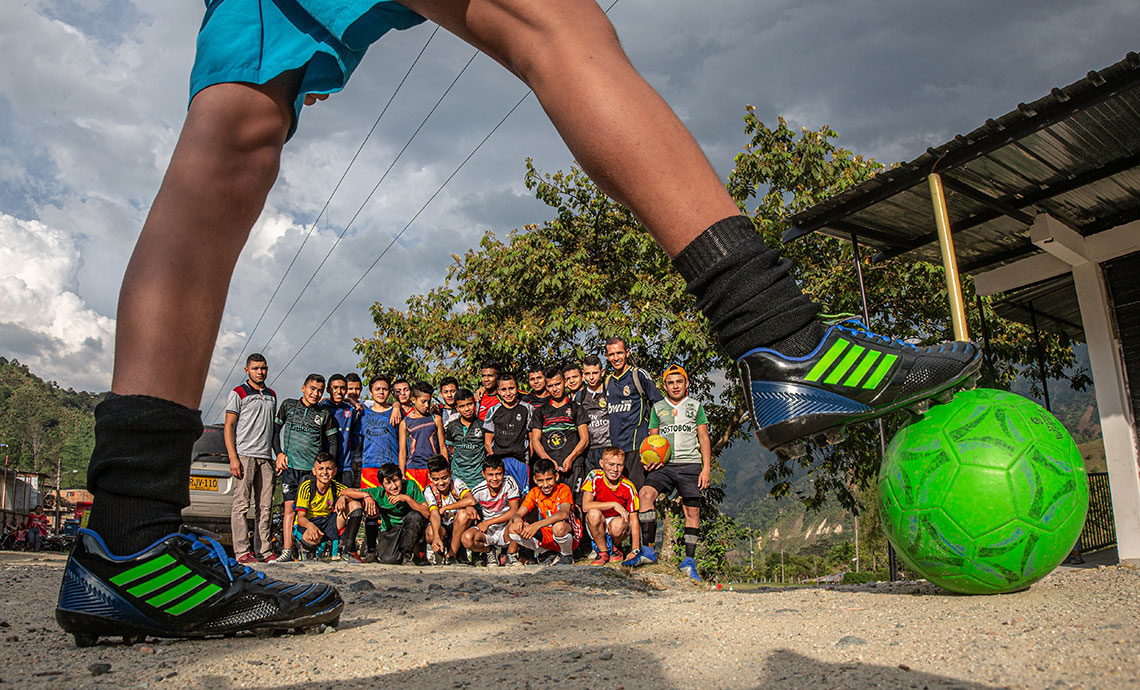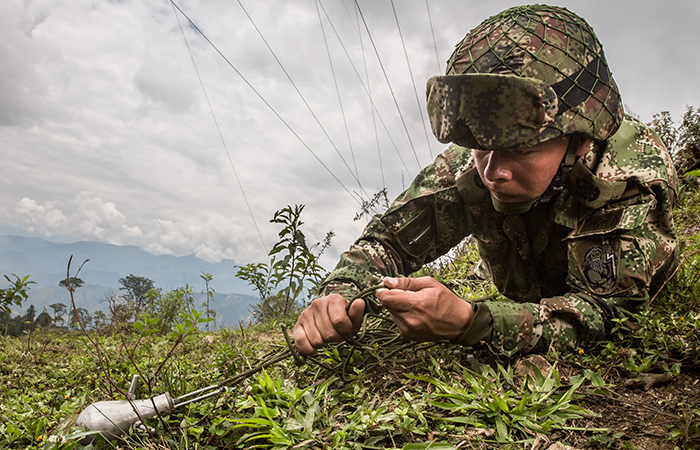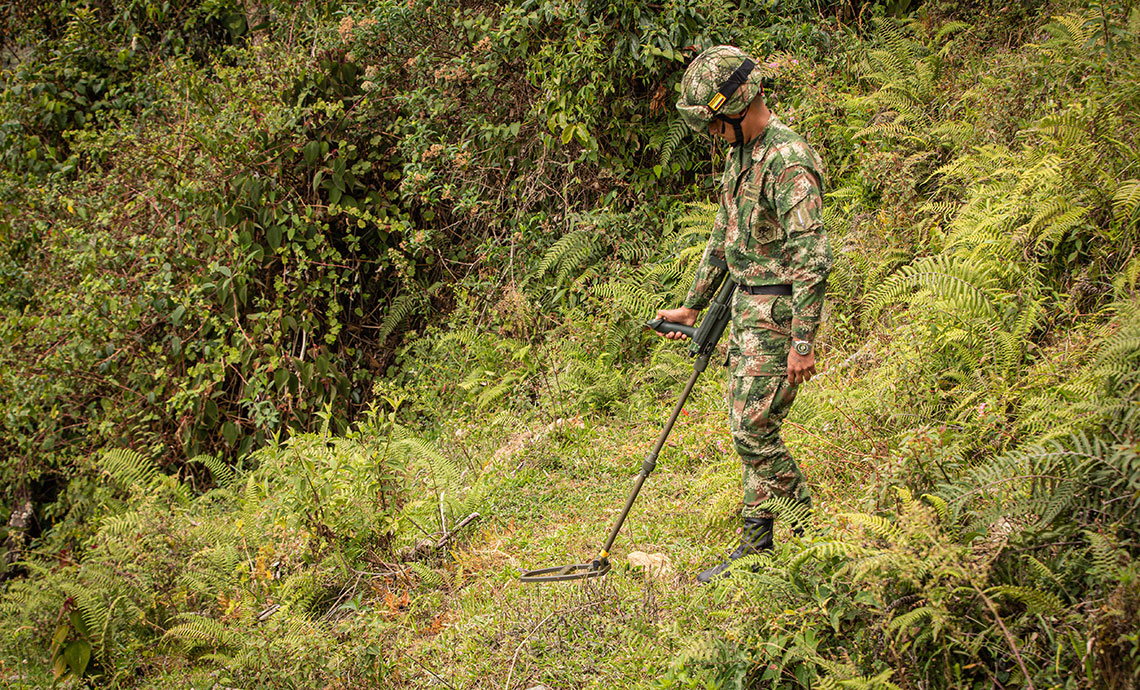
We supported educational initiatives for the children from our communities

We supported educational initiatives for the children from our communities
We want our presence in the territories to bring progress and well-being to the communities in the areas of influence of our electric energy and natural gas projects. To this end, we strengthened our Sustainability Model with a strategy for the creation of shared value, based on six social investment programs that generate economic, social and environmental development, in the framework of the Sustainable Development Goals (SDGs) and respect for human rights.
We launched six programs (Energía para la Paz (Energy for Peace), Energía para la Competitividad (Energy for Competitiveness), Energía para el Bienestar (Energy for Well-being), Energía para Aprender (Energy for Learning), Conexiones Ancestrales (Ancestral Connections) and Energía para la Transformación (Energy for Transformation)) in our four regions: South, Central, West and North.
To ensure more efficient performance of the projects developed by the Group throughout the country, the Transmission group adopted a regional approach through a team of employees from different areas. This enables the organization to focus on the top priority topics and to strengthen genuine relations in the territories.
Our creation of shared value is based on a long-term outlook and sustainability between the Group and the communities, a relationship that takes place in the framework of mutual benefit, strengthening operations management and ongoing and genuine relations.
Through our performance and relations, we seek for communities to perceive GEB as a key actor and partner in their progress, well-being and development. To this end, we identified their needs and opportunities to formulate shared value creation and social investment projects.
We also identified the key actors and the communities that will potentially benefit in the territories where we operate and we involved the communities in project formulation, development, follow-up and monitoring.
We promote skills, resources and management capabilities to lead initiatives that legitimize and develop the territories, and we create local and national strategic partnerships to formulate and implement sustainable projects.
In 2020, due to the COVID-19 pandemic, we implemented biosafety protocols for safe work at the projects. In this way, we protected the communities and our employees and contractors.
It was very challenging to engage in strengthening relationship skills, effective virtual communications, accountability, teamwork, leadership and conflict resolution and negotiations.

We resumed the prior consultations process at Colectora.
We assessed the impact our social investment and shared value projects have on society through the social return on investment (SROI) methodology, and we designed an application for its periodic measurement. (Annexes).
We formalized agreements with 33 communities of the Colectora Project, as part of the prior consultation process. These had been suspended due to the unavailability of Ministry of the Interior officials to perform consultations and by instruction of the national government to halt the expansion of the pandemic.
We carried out an exercise to identify the needs and opportunities in the territories to formulate projects, and as an organization we created a COVID-19 strategy we implemented in Transmission.
We maintained our relations through new alternative channels when traditional means were not available, and in view of the government’s measures, which determined that only the mayors had the authority to make decisions in the territories, we contacted them to explain our biosafety protocols.
We held meetings with the local health care departments, mayor’s offices and community action boards and obtained approval to perform the field activities within the authorized time frames.
We designed the actions and protocols to ensure that our meetings, even though held through virtual or other alternative channels, continued to be effective from a legal perspective.
Through our volunteers, we were able to mobilize employees and contractors to perform embellishment activities as schools and community areas and to assist vulnerable populations.
(413-1) We engage in operations, impact assessments and development programs with local community participation. (Annexes).
(413-2) We manage our actual or potential negative impacts in our communities.(Annexes).
The following were the main achievements in performance of our six shared value creation programs:
This program contributes to peace building in the territories by empowering the communities to become leaders of their own development, on recovering their social fabric and capital, strengthening institutional management, building capacity and facilitating the recovery of the territories. In this program, we have achieved the following results:
We cleared 190 kilometers of antipersonnel mines and neutralized 28 explosive devices. We held 69 training and education sessions on the risk of mines and first aid, with 2,756 participants.
We held 9 training sessions with 370 National Army soldiers on topics of environmental preservation and care.
We delivered 720 pedagogical kits on ‘Skills for Peace’ to teachers, peace promoters and social leaders. We also developed training handbooks for the Cátedra de Paz (Teaching for Peace). Both of these were achieved through Fundación para la Reconciliación.
We surveyed 417 tower sites and access routes, and 46 temporary work sites.
The Energy for Peace program filled us with pride in 2020: It was ranked in 12th place among 53 initiatives that transform the world in Fortune magazine’s Change the World ranking, and received an award under the Corporate Social Responsibility category in the Global Energy Awards, organized by Standard & Poor’s Global Platts. It also received recognition from the Global Compact for good sustainable development practices in 2020.

Military Demining operation in our Energy for Peace program
It improves the quality of life of the communities by stimulating rural economic development, cooperative organization, infrastructure for productivity, job creation and empowerment, as follows:
At the rural districts Bache, La Neira and El Milán, in the municipality of Santa María (Huila), we supported the improvement of productivity through the delivery of coffee plantation supplies, to the benefit of 81 farmer units. The improvement of 23 coffee drying canopies is in progress, which will benefit 92 people from the rural district of Beberrecio in the municipality of Teruel, Huila.
Road improvements are in progress in the department of Huila, in the rural districts of Corozal, Diamante, Los Pinos, El Moral, Pijao, Alto Pijao and San Gerardo (municipality of Palermo), in the rural districts of El Vergel, Santa Lucía and El Censo (municipality of Santa María), and the rural districts of Yarumal, Perdernal, Sinaí and Monserrate (municipality of Teruel).
In Colombia, we carried out road improvements in the rural districts of the municipalities of Santa María, Teruel and Palermo (Huila); Candelaria (Valle del Cauca); Belalcázar, Filadelfia and Pácora (Caldas), and Marsella (Risaralda), which improved mobility and life quality for the communities.
We signed a contract to perform road improvements at the rural district of La Cumbre, in Villavicencio (Meta, Colombia).
Through the road improvements, we benefited 3,805 people from Valle del Cauca, Huila, Caldas and Risaralda, because we facilitate their transportation and enable them to distribute their farm products.
It aims to improve the well-being and life quality of the people in the territories by improving housing conditions, access to water, promoting and improving spaces for physical activity and adequate use of free time.
We carried out works to improve the rural water network to the benefit of 190 people in the rural district of Santa Lucía, municipality of Íquira (Huila).
We made home improvements at 245 homes in the municipalities of Santa María, Palermo, Íquira, Teruel, Agrado (Huila), as well as Planadas (Tolima), that benefited close to 1,400 people.
We made progress in improvements to the environmental classroom of the rural district of Gualpí, in Teruel (Huila), which benefits 252 people; of the sports court in the rural district of Las Mercedes, in Rioblanco (Tolima), which benefits 450 people, and milking sheds in the rural district of Puerto Tolima, in Planadas (Tolima), which benefits 72 people.
We signed an agreement to strengthen recreational activities by improving the playground in the rural district of La Feria, municipality of Pradera (Valle del Cauca), and another to improve playgrounds and bio-healthy parks in the departments of Antioquia, Caldas, Meta, Boyacá, Santander and Cundinamarca. Overall, in 2021, we will hand over eight bio-healthy parks and nine playgrounds, with total investment of COP 598,756,465.
It recognizes education as the driver for individual, family and collective development. It aims to bring tools and methodologies that contribute to increase the coverage and quality of education.
In Colombia, we delivered six Solar Energy Interactive Classrooms initiatives in El Paso and Valledupar (Cesar), Hatonuevo and Villanueva (La Guajira) and Marsella (Risaralda), in schools of the Wayú and Embera Chamí indigenous communities. This was achieved thanks to a partnership between the National Ministry of Education, GEB and TGI.
We received the Andesco 2020 Great Award for Sustainability, which highlighted our work in programs such as Solar Energy Interactive Classrooms, inter-cultural relations with ethnic groups and strengthening of the occupational safety and health culture.(Annexes).
This program recognizes cultural diversity. It aims to support initiatives that enable the recovery of the historical cultural memory, the strengthening of knowledge and practices, rescuing of ethnic identity and the preservation and continuity of ancestral traditions.
We initiated an agreement with Women Together Foundation to support 30 women artisans from ethnic communities in Mocoa (Putumayo), settled in the area of influence of the Renacer Project, through activities of empowerment, training and qualification to leverage their handicraft activities. In this project currently in progress we have invested COP 29,966,280.
It aims to protect the ecosystem and reduce greenhouse gas emissions by promoting in the communities efficient technologies and access to clean low-emission energy sources.
We installed a solar lighting system at the sports facility in the rural district of Herrera, municipality of Rioblanco (Tolima), which benefits 2,248 inhabitants, who are now able to engage in sports activities both at day and night.
Installation of 11 biodigesters is in progress in the rural district of Potreritos, in Íquira (Huila), which help strengthen sustainability practices in everyday activities, to the benefit of over 70 people.
We signed an agreement to develop public space lighting projects in the rural districts of Amagá, Angelópolis, in Belalcázar, Santa Bárbara (Antioquia); El Tambor, Belalcázar and Riosucio (Caldas); Samaria and Acacías (Meta).
In 2020 we invested COP 15,735,505, with 2,320 beneficiaries.
We invested COP 625,050,993 in projects that benefit 6,106 people:
Upgrading of the water network in Lérida (Tolima).
Improvement of country roads in La Tebaida (Quindío).
We improved the sports field of the rural district of Purnio, in La Dorada (Caldas).
We performed maintenance on the windmills and built traditional kiosks in Manaure (La Guajira).
Construction of a mill for the community of Guamachito, in Hatonuevo (La Guajira).
With the support of Corporación Maloka, the Ministry of Education, GEB and Universidad Antonio Nariño, we completed four projects to build and equip interactive classrooms, the development of biodigester and photo-reactor prototypes to produce biogas in rural communities.
We invested COP 1,051 in 9,000 school kits we delivered to school populations in the territories where we are present, to the benefit of 11,323 people, and to strengthen relations with the academic communities.
Through our Soup Kitchens program, Cálidda offers 854 soup kitchens in Lima and Callao facilities to continue having access to natural gas services. Through this support, we indirectly benefited over 72,000 people who depend on this service to have access to meals every day.
We enabled the natural gas services in the 1,096 apartments at Villa Panamericana, where the Temporary Isolation Assistance Center for COVID-19 Patients operates, which enabled over 3,000 patients receive assistance with greater comfort.
Through our volunteer program Voluntades Cálidda, we partnered with Techo, UNDP and Asociación Trabajo Voluntario to mobilize over 424 volunteers to have an impact on the lives of 21,168 people in vulnerable situation.
Through non-bank financing, we granted loans to over 8,740 families.
We started up the application of Social Return on Investment to economically assess the impacts and benefits associated with our social actions. The result is that for every dollar invested, the net social return is USD 1.96, with a coverage of 40,885 beneficiaries and an investment of USD 6,882,500.
We invested PEN 141,569 in the Energía Solidaria (Supportive Energy) program for the installation of natural gas at five fire stations, where 674 people work, to ensure they have permanent energy.
In the Escuelas Afectivas (Affective Schools) project, jointly with IPAE (Instituto Peruano de Administración de Empresas), we are adapting (in a virtual and digital manner) to continue its implementation, with duration of five years (2019-2023) and that benefits 700 students, 350 families and 30 teachers from the most vulnerable areas of our concession.
Jointly with the Chamber of Commerce of Ica, we started up the San Vicente de Paul Oxygen Power Plant at Electro Dunas facilities, to provide oxygen to the hospitals, clinics and families in the region affected by COVID-19.
Through the NGO Caritas, we delivered food packages and disinfection supplies to over 500 low-income families in the Ica region.
We had an impact on 10,385 people through the implementation of road infrastructure and public space building programs. See annex.
We have the challenge of developing alliances with the communities and local governments, understanding their priorities in view of the new reality.
Innovate in the way we communicate with our stakeholders in this new virtual era and search for new ways to generate impacts in the communities.
Carry out the activities despite the restrictions in the field due to the pandemic.
Try to satisfy the basic needs of the communities, with a balance between the short and medium term.
Implement the social management activities as set forth in the Social Management Plan, the resettlement procedure, the manual for performance of shared value creation projects, the relations protocol, the inter-cultural relations manual and the HSE Annex.
Move forward in the transition towards the creation of shared value to develop initiatives with the communities that are coordinated and that create true opportunities for progress, well-being and development.
Complete the implementation and monitor the usage plans of the shared value creation and social investment projects in the South region, complete the identification and prioritization phase in the Central region, implement the contracted activities in the Western region.
Agree on projects with the communities in the Northern region that have an impact on their development and that produce a mutual understanding of the priorities, interests and needs of each.